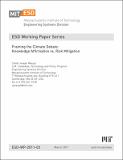Framing the Climate Debate: Knowledge Affirmation vs. Risk Mitigation
Author(s)
Waugh, Caleb Joseph
Downloadesd-wp-2011-03.pdf (312.1Kb)
Metadata
Show full item recordAbstract
Opinions regarding the anthropogenic climate change hypothesis (ACC), along with the possibility of subsequent catastrophic environmental impacts, often break down along ideological lines that have lead to a dichotomy between “believers” on the one hand, and “non-believers” on the other. Although some scientific uncertainty remains, the current body of scientific evidence supporting the hypothesis is significant and enough to warrant consideration of a strong policy response. However, for any progress to be made on the policy front, the existing ideological dichotomy between believers/non-believers must be overcome. This will require policy advocates, including scientists, to do a much better job framing the scientific argument for policy intervention more in terms of the inherent scientific uncertainty and risk mitigation instead of suggesting that scientific outcomes and subsequent catastrophic events are indisputable. Much can be learned regarding a proper framing of climate science through philosophical reflection of the metaphysical and epistemological nature of science, and by considering similar historical examples of scientific knowledge assessment. Although reframing the debate in terms of the inherent scientific uncertainty is not sufficient to overcome all obstacles, having policy makers and the general public at large properly recognizing the nature of the scientific argument, instead of adhering to a believer/non-believer false dichotomy, is a first and necessary step.
Date issued
2011-03Publisher
Massachusetts Institute of Technology. Engineering Systems Division
Series/Report no.
ESD Working Papers;ESD-WP-2011-03